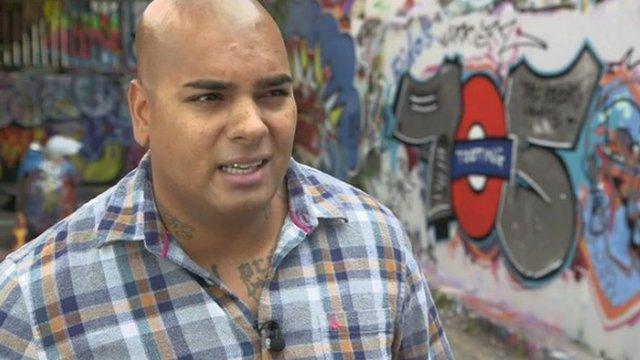Gangs and drugs fuelling upsurge in prison violence
- Published
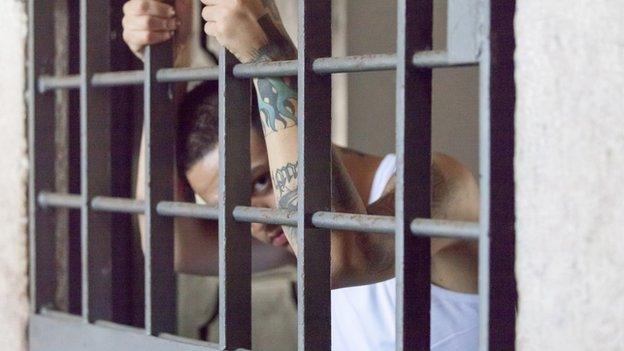
Gang culture is a problem in prisons
Three female prison officers are standing in line ready to greet me as I'm shown around the first-night centre at High Down men's prison, external in Surrey.
The house-block, which holds prisoners in the first few days after they have been sentenced or remanded by the courts, is spotlessly clean and eerily quiet.
The officers exude an air of calm authority and control.
"A lot of what we do is we take their default setting of 'angry' and make it into 'reasonable'," says Prison Officer Debbie Glanfield of the thousands of adult inmates who pass through the gates of High Down every year.
"And a lot of our time is spent on a one-to-one basis, getting that anger gone."
The two other officers nod in agreement.
But that subtle and emollient approach doesn't always work.
Glanfield has been attacked three times in three years: first, she had excrement poured over her; then she was assaulted and broke a rib and in the last incident she needed eight stitches in the back of her head.
"Not one of these people are going to be collecting their Citizen of the Year award," she says in typically under-stated fashion.
But the violence left its mark in more than just a physical sense.
Glanfield seriously considered whether she wanted to continue in the job, particularly after being covered in excrement.
"It was very humiliating, very upsetting and it did tip me to the very edge," she admits.
The officer carried on, though, and has now chalked up 12 years in the job.
Assaults increasing
Violence comes with the territory of being a prison officer, and High Down, a well-run jail with an impressive governor, works hard to keep it to a minimum.
There will always be assaults because many of the people in jails are violent - and almost all of them don't want to be there.
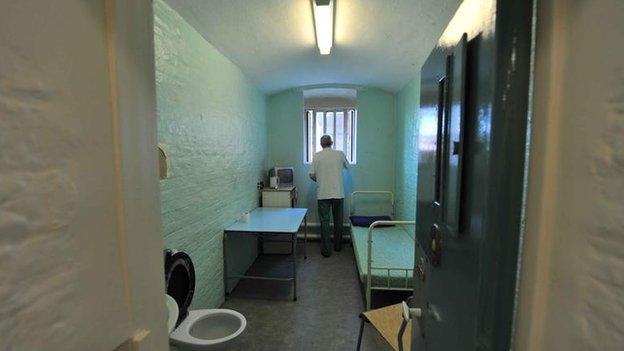
Inmates are angry at cut to their privileges
But across the wider prison estate, in England and Wales, the level and severity of the violence are growing.
In the 12 months to the end of June 2014 there were 15,441 assault incidents, the highest figure for six years. Ninety-six percent of incidents were in male prisons.
The number of assaults classed as "serious" reached record levels, 1,817, of which 395 were serious assaults on prison staff - also an all-time yearly high.
Part of the explanation appears to lie in the type of offender who is ordered to serve time in custody.
Andrew Selous, the Prisons Minister, cites a 40% rise in the number of offenders jailed for violent offences over the past decade - a trend which no doubt reflects society's increasing intolerance towards violence and stiffer sentencing.
"It's a more challenging prison population than in the past - more ready to resort to violence," he says.
Prison officers and governors agree that prisoners are more likely to use fists, feet and home-made weapons to settle disputes than they once were.
Gang culture
Much of the violence is also related to gangs; offenders who are in gangs outside jail are unlikely to leave their affiliations behind once they are inside.
And even if rival gangs are split up in jails - placed on different wings, or monitored to ensure they don't exercise or do activities together - they can instruct "third parties" to carry out assaults.
Steve O'Connell, President of the Prison Governors Association, says tackling the problem is a complex task: those behind gang violence are not necessarily the ones you would expect.
"They may well actually be prisoners who actively take part in a regime, so they they may be perfectly friendly {to} the staff.
"But the best cover for doing business is not to draw attention to yourself."
The pattern of violence has been complicated further by the arrival in jails of a new drug, a legal high, known as Spice or Black Mamba, external, which Nick Hardwick, the Chief Inspector of Prisons, says is becoming the "drug of choice" among inmates.
Spice is legal to possess outside prison, but is banned inside, as other recreational substances are.
The attraction for prisoners is that once Spice is smuggled in it is hard to detect because its chemical composition can be altered: it doesn't usually show up in prison drug tests.
The problems for the prison authorities are that Spice is so much in demand that it leads prisoners into debt, which in turn causes bullying and violence when they can't re-pay what they owe.
It also has an unpredictable and volatile effect on those who smoke it.
Frenzied fighting
Michael Rolfe, a prison officer at Elmley Jail, Kent, says the drug sends people into a "frenzy", making them to hard to control.
"They will fight with us because of the intoxication they are under, deliberately so, and they will also have a heightened strength and a heightened adrenalin, as well.
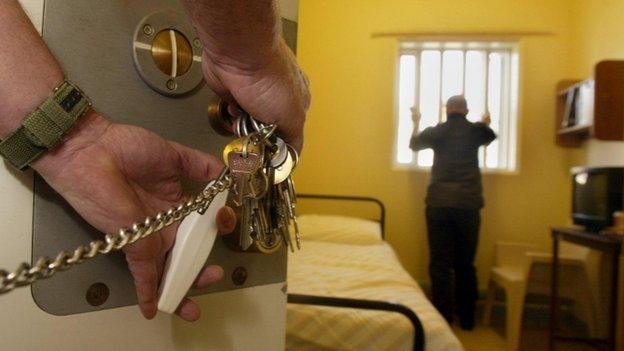
Staffing shortages have exacerbated problems in prisons
"So, it not only makes them a lot stronger than they are normally, they fight for a lot longer than they do normally."
One of his colleagues is currently on long-term sick leave after being knocked unconscious by a prisoner who it is suspected had taken the drug.
Developing a test that can detect Spice is a "very, very high priority" for Andrew Selous.
Although the Prisons Minister is cautious about timescales, there are indications that a breakthrough may not be far off; in the meantime it is understood some prisons are training drug dogs to sniff out legal highs.
Two other factors have undoubtedly played their part in creating unrest in prisons - though by exactly how much is hard to quantify.
First, changes to the Prisoners' Incentives and Earned Privileges scheme, external, designed to encourage responsible behaviour, stoked anger and resentment among inmates, with thousands complaining that the changes were unfair and unclear.
The reforms, in 2013, led to a near total ban on parcels; restrictions on the use of in-cell televisions; and tougher rules for inmates who'd been downgraded in status from "enhanced" to "basic".
Lack of staff
Second, as prison officers took redundancy as part of government budget cuts, there were serious staff shortages, external in some prisons, particularly those in south-east England.
Half of the 10,000 governor, officer and support worker posts that have been cut in publicly-funded jails since 2010 were lost in 2013-14 - temporary officers were bussed into the jails hardest hit from other prisons, so-called "detached duty".
No one can prove a clear link between staff cuts and violence, but prison officers say they have been so stretched in some areas it has been hard to foster good relationships with prisoners, a pre-requisite for stability.
A recruitment exercise is under way, belatedly, critics would say.
Selous says an extra 1,700 officers will be in place by April, and numbers will be maintained after that.
At High Down, in Surrey, which is coping well despite being 35 staff short of its target figure, Debbie Glanfield and her colleagues will welcome reinforcements - anything that gives prison officers a bit more face-to-face time to defuse prisoner anger.
Hear Danny Shaw's report on File on 4, BBC Radio 4 at 2000 on 13 January.
- Published13 January 2015
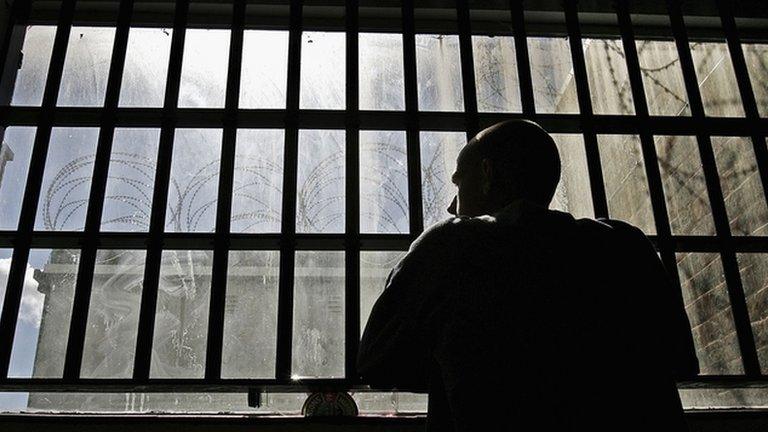
- Published16 November 2014
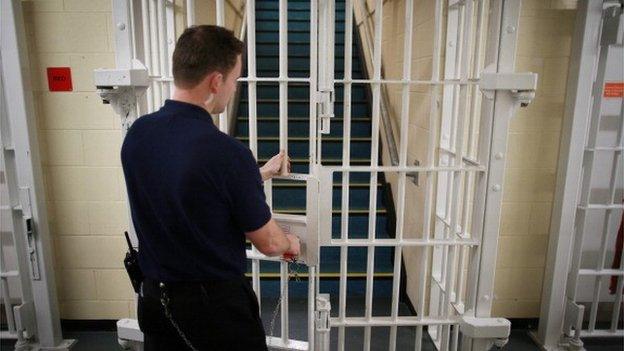
- Published19 August 2014
